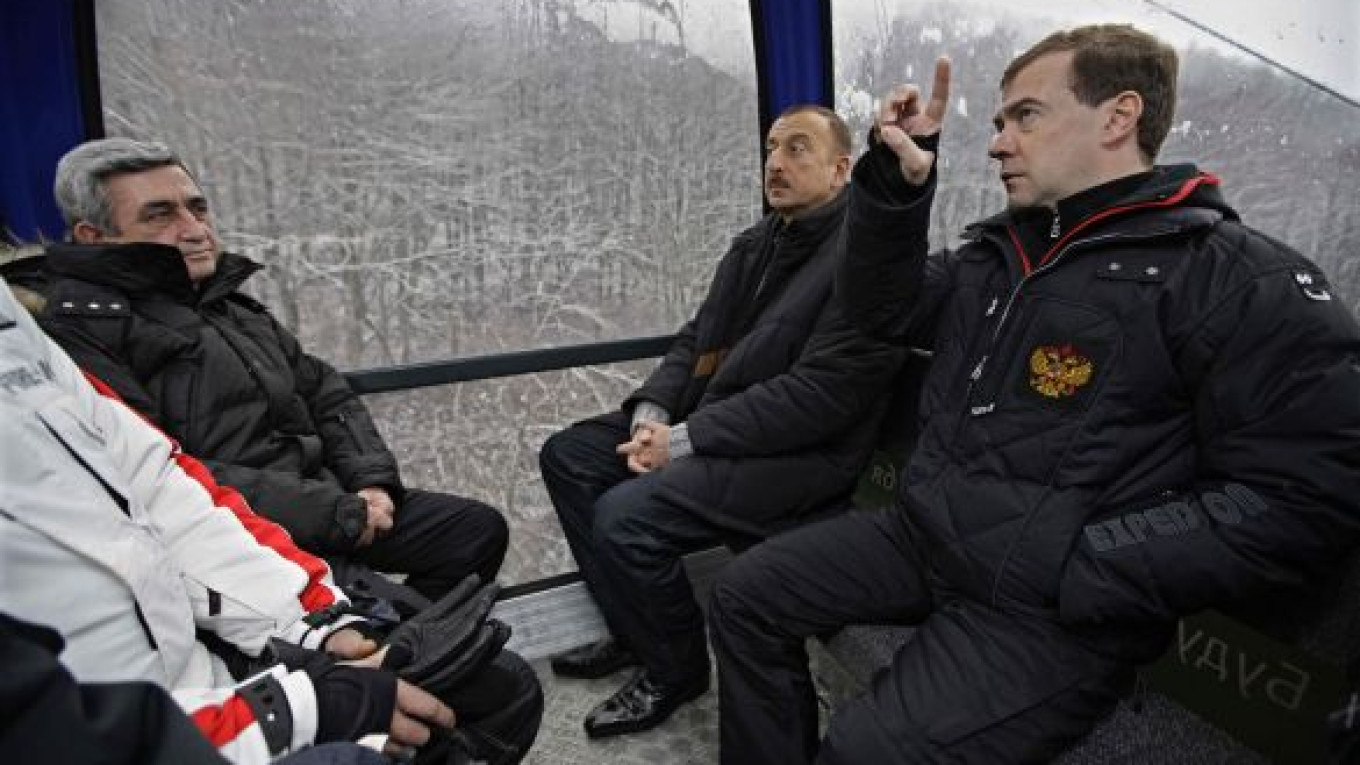Armenia and Azerbaijan have agreed on a preamble to an agreement on the Nagorno-Karabakh conflict, Foreign Minister Sergei Lavrov said Monday.
"There is a general understanding on the preamble of the document," Lavrov said in Sochi after talks between the two country's leaders and President Dmitry Medvedev, Interfax reported.
Neither Medvedev nor Presidents Serzh Sargsyan of Armenia and Ilham Aliyev of Azerbaijan made any public statements after the closed-door talks in Medvedev's residence in the Krasnaya Polyana resort above Sochi.
Lavrov said the sides had agreed to forward their own suggestions for alterations to the so-called Madrid principles, a set of proposals for a political solution in the 20-year conflict in the South Caucasus.
"The main result today is that both sides will prepare their tangible ideas of how to formulate the text where there is no agreement," Lavrov said.
The principles, adopted in late 2007, envisage returning territories occupied by Armenian troops that lie outside Karabakh proper to Azerbaijan but leaving a corridor linking Armenia with the disputed province on Azeri soil.
The plan, worked out by Russia, France and the United States, which have led the Organization for Security and Cooperation in Europe's mediation efforts, stipulate that the status for Nagorno-Karabakh would be determined in a referendum that refugees should be allowed to return and that an international peacekeeping force be deployed.
Nagorno-Karabakh, an ethnic Armenian enclave inside Azerbaijan, broke away after a bloody conflict in the early 1990s that killed more than 30,000 people and displaced more than 1 million.
The Madrid principles, which were made public only last summer, were met with fierce criticism by the Armenian opposition.
Moscow has in recent years stepped up its own mediation efforts in the seemingly intractable conflict, and Sargsyan and Aliyev pledged that their countries would step up efforts to find a peaceful solution over Nagorno-Karabakh in a five-point declaration reached at a meeting with Medvedev in November 2008.
Last year, the two presidents met for talks six times, including two rounds with Medvedev.
Analysts have said the efforts show Moscow's assertion of influence in the South Caucasus, were Western influence has subsided after the Georgia war in August 2008, the global financial crisis and the leadership change in the United States.
Armenia has been irked by increasing rapprochement between its Turkic neighbors and Moscow, which recently signed energy agreements with both Azerbaijan and Turkey.
Earlier this month, state energy giant Gazprom announced plans to quadruple the amount of gas that it buys from Azerbaijan in 2011, and Turkish Prime Minister Recep Tayyip Erdogan agreed with Prime Minister Vladimir Putin to spur efforts to build the $2.5 billion Samsun-Ceyhan oil pipeline in Turkey.
A Message from The Moscow Times:
Dear readers,
We are facing unprecedented challenges. Russia's Prosecutor General's Office has designated The Moscow Times as an "undesirable" organization, criminalizing our work and putting our staff at risk of prosecution. This follows our earlier unjust labeling as a "foreign agent."
These actions are direct attempts to silence independent journalism in Russia. The authorities claim our work "discredits the decisions of the Russian leadership." We see things differently: we strive to provide accurate, unbiased reporting on Russia.
We, the journalists of The Moscow Times, refuse to be silenced. But to continue our work, we need your help.
Your support, no matter how small, makes a world of difference. If you can, please support us monthly starting from just $2. It's quick to set up, and every contribution makes a significant impact.
By supporting The Moscow Times, you're defending open, independent journalism in the face of repression. Thank you for standing with us.
Remind me later.


